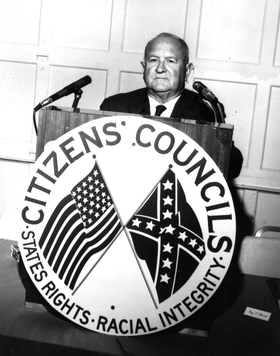
Savannah is the oldest city in the U.S. state of Georgia and the county seat of Chatham County. Established in 1733 on the Savannah River, the city of Savannah became the British colonial capital of the Province of Georgia and later the first state capital of Georgia. A strategic port city in the American Revolution and during the American Civil War, Savannah is today an industrial center and an important Atlantic seaport. It is Georgia's fifth most populous city, with a 2020 U.S. census population of 147,780. The Savannah metropolitan area, Georgia's third-largest, had a 2020 population of 404,798.

Statesboro is the most populous city in and county seat of Bulloch County, Georgia, United States. Located in the southeastern part of the state, its population was 33,438 at the 2020 census. It is the principal city of the Statesboro micropolitan area, which had 81,099 residents, and is part of the Savannah–Hinesville–Statesboro combined statistical area.

Sylvania is a city in and the county seat of Screven County, Georgia, United States. The population was 2,634 in 2020.

Charles Whitlow Norwood Jr. was an American politician who served as a Republican member of the United States House of Representatives from 1995 until his death in 2007. At the time of his death, Norwood was the representative of the 10th District of Georgia.

Othell Maxie Burns Jr. is an American politician and academic from the state of Georgia. A member of the Republican Party, Burns has represented the 23rd district in the Georgia State Senate since January 2021. He previously served in the United States House of Representatives from 2003 to 2005, representing Georgia's 12th congressional district. From 2012 to 2017 he was the president of Gordon State College in Barnesville, Georgia.

Georgia Southern University is a public research university in the U.S. state of Georgia. The largest campus is in Statesboro, with additional campuses in Savannah and Hinesville. Founded in 1906, Georgia Southern is the fifth-largest institution in the University System of Georgia. The university offers over 140 different academic majors in the bachelor's, master's, and doctoral levels. The university has a combined enrollment of approximately 27,000 students from all 50 states and over 80 countries. Georgia Southern is classified among "R2: Doctoral Universities – High research activity" and a "comprehensive" university by the University System of Georgia.

Eugene Talmadge was an attorney and American politician who served three terms as the 67th governor of Georgia, from 1933 to 1937, and then again from 1941 to 1943. Elected to a fourth term in November 1946, he died before his inauguration, scheduled for January 1947. Only Talmadge and Joe Brown, in the mid-19th century, have been elected four times as governor of Georgia.

Ronald Bryan "Bo" Ginn, was an American politician who represented Georgia's 1st congressional district in the United States House of Representatives from 1973 to 1983.

East Georgia State College (EGSC) is a public college in Swainsboro, Georgia. It is part of the University System of Georgia. As an access institution, the college serves a predominantly rural area of 24 counties in Georgia's coastal plain from its three campus locations.

Ralph Emerson McGill was an American journalist and editorialist. An anti-segregationist editor, he published the Atlanta Constitution newspaper. He was a member of the Peabody Awards Board of Jurors, serving from 1945 to 1968. He won a Pulitzer Prize for editorial writing in 1959.
Francys Johnson is an American civil rights attorney, pastor and educator. He is in private practice as an attorney in Statesboro, Georgia. He has lectured on constitutional and criminal law, civil rights and race and politics at Savannah State University and Georgia Southern University.

U.S. Highway 25 (US 25) is a United States Numbered Highway that travels from Brunswick, Georgia, to the Kentucky–Ohio state line, where Covington, Kentucky, meets Cincinnati, Ohio, at the Ohio River. In the U.S. state of Georgia, US 25 is as a 190.0-mile-long (305.8 km) highway that travels south to north in the eastern part of the state, near the Atlantic Ocean, serving Statesboro and the Brunswick and Augusta metropolitan areas on its path from Brunswick to South Carolina at the Savannah River. Its routing travels through portions of Glynn, Wayne, Long, Tattnall, Evans, Bulloch, Jenkins, Burke, and Richmond counties.
Sports in Georgia include professional teams, Olympic Games contenders and medalists, collegiate teams in major and small-school conferences and associations, and active amateur teams and individual sports.

The Savannah metropolitan area, officially named the Savannah metropolitan statistical area by the U.S. Office of Management and Budget, is a metropolitan statistical area in the U.S. state of Georgia. It is centered on the city of Savannah and encompasses three counties: Bryan, Chatham, and Effingham.

Southern Pride is the name for the marching band of Georgia Southern University located in Statesboro, Georgia.
The Cocking affair was an attempt in 1941 by Georgia governor Eugene Talmadge to exert direct control over the state's educational system, particularly through the firing of Professor Walter Cocking because of his support for racial integration, and the subsequent removal of members of the Georgia Board of Regents who disagreed with the decision. It has been made into an opera entitled A Scholar Under Siege.

The Three governors controversy was a political crisis in the U.S. state of Georgia, from 1946 to 1947. On December 21, 1946, Eugene Talmadge, the governor-elect of Georgia, died before taking office. The state constitution did not specify who would assume the governorship in such a situation, so three men made claims to the governorship: Ellis Arnall, the outgoing governor; Melvin E. Thompson, the lieutenant governor-elect; and Herman Talmadge, Eugene Talmadge's son. Eventually a ruling by the Supreme Court of Georgia settled the matter in favor of Thompson. Georgia's Secretary of State Ben Fortson hid the state seal in his wheelchair so no official business could be conducted until the controversy was settled.

The lynching of Paul Reed and Will Cato occurred in Statesboro, Georgia on August 16, 1904. Five members of a white farm family, the Hodges, had been murdered and their house burned to hide the crime. Paul Reed and Will Cato, who were African-American, were tried and convicted for the murders. Despite militia having been brought in from Savannah to protect them, the two men were taken by a mob from the courthouse immediately after their trials, chained to a tree stump, and burned. In the immediate aftermath, four more African-Americans were shot, three of them dying, and others were flogged.

Roy Vincent Harris was an American politician and newspaper publisher in the U.S. state of Georgia during the mid-1900s. From the 1920s until the 1940s, Harris served several terms in both the Georgia House of Representatives and the Georgia State Senate, and was twice the speaker of the house, from 1937 to 1940 and again from 1943 to 1946. Historian Harold Paulk Henderson has called Harris "one of Georgia's most capable behind-the-scenes politicians".















